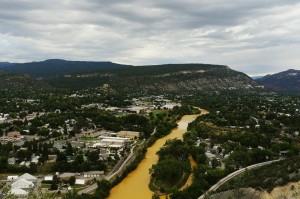Everyone may be entitled to a little hypocrisy once in a while, but the Environmental Protection Agency (EPA) is abusing the privilege this week.

Animas River in Durango, Colorado after EPA caused spill that polluted the water for hundreds of miles
How it happened and why it happened (i.e. why they didn’t know there were 3 million gallons of contaminated water there before digging) will be under investigation for some time. Accidents happen, but this was a humdinger. Colorado and New Mexico had to declare states of emergency, at least four counties banned swimming, fishing, or floating on the rivers, the Navajo Reservation had to stop water usage, farmers had to close irrigation headgates and ranchers were told not to water livestock – it’s not yet clear for how long.
We all understand that accidents happen, and in this case the EPA was apparently in the process of doing important cleanup work. It would be easy for everyone to forgive the mistake and pitch in to fix any damage. Instead, people in three states are angry, demanding answers and reparations. The simple reason for the furious reaction is EPA’s fault, too.
People would be more forgiving if it were not for the judgmental and iron-fisted attitude the EPA takes against anyone else who causes such an accident. And make no mistake about this – the EPA will pay no fine. As former Assistant Attorney General Tom Sansonetti told the press this week, “The government doesn’t fine itself.” That often harsh treatment is for everyone else, even though such spills are always accidental.
Here’s how EPA treats similar accidents by others:
• When a coal-disposal pond sprung a leak and contaminated a North Carolina river last year, the company was prosecuted in federal court and agreed to spend $34 million on river and wetlands projects, and pay a $68 million criminal fine.
• A pipeline company was fined $34 million for a series of accidental spills totaling 1 million gallons of oil and gasoline in three southern states (same number of states as the EPA’s recent accident, and about one-third as large a spill).
• An oil company in Alaska was fined $25 million over two oil spills that totaled 213,000 gallons.
• A North Carolina farmer was sentenced to six months of house arrest and fined $15,000 for “discharging” water tainted with cow manure into a local river.
• In a current case, EPA may impose on Enbridge the stiffest fine ever for a pipeline spill. The company is expecting a $40 million penalty for spilling 1 million gallons of oil into Michigan’s Kalamazoo River five years ago, though the fine could reach $100 million.
For the Animas River spill, EPA may decide to pay for cleanup costs, though it might be years before that happens. Such unbudgeted costs would have to be appropriated by Congress in some future year, once those costs are determined. They may be very substantial. As Sansonetti explained, it includes environmental cleanup, but also reimbursing damage done to businesses. “You’ve got rafting companies that couldn’t raft, kayakers that couldn’t kayak, ranchers that didn’t want spoiled water being drunk by their cows.” Some jurisdictions are having to truck in drinking water, and others had to shut down businesses for a time.
EPA says if businesses or residents face personal injury or property damage, they can file a claim for “damage caused by U.S. government actions.” The agency’s regulations allow six months to rule on claims, but EPA says it will try to respond sooner.
Lest anyone think the agency callous, EPA Administrator Gina McCarthy says she is very sorry it happened. But there is still no information for businesses, landowners, or local governments about potential health risks, which could be extensive.
When the inevitable congressional inquiries begin, before taxpayers are forced to pay huge costs for this blunder, EPA is going to face some very tough and unfriendly questions. The agency has only itself to blame for that. Such a taste of its own medicine could soften EPA’s treatment of others in the future – but don’t count on it.
(A version of this column originally appeared in the Grand Junction Daily Sentinel August 14, 2015)




Comments on this entry are closed.